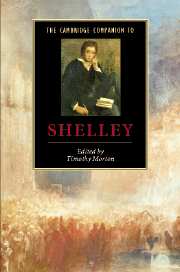9 - Literature and philosophy
from Part III - Ideas, beliefs, affiliations
Published online by Cambridge University Press: 28 January 2007
Summary
Thinking beyond Platonism
Considered from a philosophical point of view, Percy Shelley's writings are most intriguing because they so signally look both backwards and forwards in the history of philosophy. First of all, they draw on materialist and empiricist traditions in philosophy from which Romanticism is usually thought to have distinguished itself. Secondly, Shelley's thought anticipates those more modern materialisms that displace the individual subject as the starting point for speculation, substituting instead the larger, impersonal vistas of our social and natural being. Both kinds of thinking are expressed as much through his poetry, and the way it is written, as through his discursive prose, and the arguments it sets out.
Shelley was aware that his thought pointed before and after, a speculative habit which in any case he attributed to characteristically human self-understanding. In his fragment 'On Life', he plots his transition from an early belief in materialism to the 'intellectual system', a philosophy that sounds idealist, but, as we shall see, actually is not. The philosophical characterization, however, most often given to Shelley has been that of Platonist. This is fair enough, provided a wide enough view of Plato is taken. Shelley is never straightforwardly idealist, but nor is Plato. The later Plato of the Timaeus describes the drives and forces of a Demiurge whose orderly deployment of original matter creates out of chance effects or necessity the perfect originals of everything. Necessity is 'persuaded' by the Demiurge to see in a random possibility the best example of something. The 'principle' of a future member of our universe is recognized. Creation is as dependent on a chance material occurrence as it is on a subsequent rational selection. Only afterwards, for the purposes of distinguishing general and individual terms, are these 'principles' or 'forms' of things abstracted from particularity and relocated in the ideal world - a postulate that, unfairly, became synonymous with Platonic thought.
- Type
- Chapter
- Information
- The Cambridge Companion to Shelley , pp. 166 - 184Publisher: Cambridge University PressPrint publication year: 2006
- 2
- Cited by

